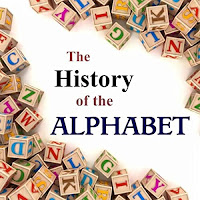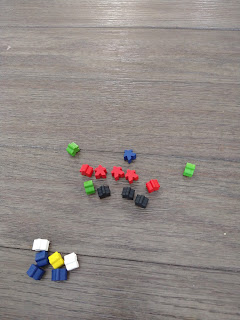Session two covered two days, which brings us to the 3rd day on the island. We break off from the action at midday of day 3.
The party rested up uneventfully the first night and is trying to figure out what to do next. Not having horses has them hamstrung. They have too much equipment to carry and some of it like the saddles is pointless to take along with them. Bartholomew, Masha, Alex, and the two sailors are charged with determining what will go and what will stay.
While they are busy with that, the rest of the party splits up into two teams, red and blue. Red Team is the Cleric Garven and William the Ranger. Alice the Elf, Rolf the Fighter, and Gerwinder the Paladin make up Blue Team. They decide to ditch most of their gear and set out exploring to the south by two different routes.
And much to my embarrassment, I realized that I accidentally set up the party on the map of Sardinia, not Corsica. I scrolled too far south. Oh... I'll just roll with it.
Each small hex is 1.2 miles and the weather is good. It's been cloudy and warm for winter, in the 60s (or 16° C). Since this map is based on a real place, I have simply been looking at the real weather in Palau, Sardinia. Why reinvent the wheel?
Red Team moves to the grasslands at a slow pace. On the way south, they encounter nothing. Blue Team moves down the beach and onto the grasslands. The blue team has an animal encounter right away. They notice two strange-looking donkeys or mules following them. They are unable to approach them too closely but determine they must be some sort of feral ponies.
On the way home, Red Team encounters Ezekiel the warhorse. The animal can speak to humans but is rather closed-lipped about how he got there. As the two teams return to camp, an odd thing happens. The feral ponies start to follow Ezekiel. The warhorse advises the Paladin that there is a herd of ponies and he has been trying to avoid the beasts since he got here.
That of course begs the question of how he got here.
Ezekiel tells the party that the horse sling fell overboard as the sailors tried to take it down. Two sailors went in the water with it. The horse jumped in to rescue them. Having done his duty honorably, he was annoyed when the men walked off northwest.
Back at camp, everyone greets their newest adventurer. Bartholomew and the sailors are super excited to see the extra pack animals and tried to lasso one of the ponies. The thief took a kick to the chest for his trouble.
While Garvin quickly ministers Barth's chest injury, Alex, Alice and William assess the ponies. They are too small to ride and too skittish to capture. It's an odd standoff as the ponies seem to be attracted to Ezekiel but too scared to approach the adventurers.
The party settles in for night two on the island, no further along than when they landed. But they discover quite a few things about each other. It turns out that both sailors were rowers elevated to seamen. Sammy likes to fish and the George likes to whittle. They were leading the mules because neither is very adept at seamanship, yet.
Ezekiel shares that the other two sailors took off towards the northwest. Gerwinder explains that the horse is being literally accurate. The last time the horse saw them, they probably walked exactly direction up the beach.
Alex discovers that Sammy and Alice can sing and the music brings the ponies closer. Alice was able to toss some fruit at them and they tolerated it. Once to food was gone and the music stopped, they retreated. They hope the routine will tame the ponies, but they have their doubts.
The day three plan has the party moving westward and then south. It wasn't the plan, but the two missing sailors are without food and water. Also, the party has more food than they can easily carry. The Ranger and Theif want to hang it in a tree. They can see the foliage of shrubs and small trees to the southwest. They'll be moving pretty slowly due to the load, but if they can find the other sailors, they can share their supplies and load. If not, they'll cache the extra food.
I am using the item-based encumbrance tracker for OSE. The party is trying to tote their personal gear, two tents, and 24 saddlebags full of extra food and supplies. I've decided that each individual saddlebag is a little smaller than a backpack so two together are about the size of 1 and 1/2 backpacks. Each mule can carry 4 or one of the tents. Ezekiel can carry two saddlebags and a rider.
Before setting out, they fill the rowboat with the saddles, extra baggage cover it with the tent, and rope it down. The sailors were great at this.
They have 24 saddlebags. The equines are carrying 10, the two sailors are carrying 4. That leaves 10 extra bags. They leave the remainder at the campsite with the intention of reaching the stand of trees and shrubs by midday. This should leave time for them to cache some food in a tree and return for the rest. However, the party is of the opinion they may not want to or have to.
They make it 3.5 of the 5 miles to the shrublands before trouble occurs. William spots footprints leading south. He gleans that two men passed through the area at a run. The terrain is undulating, so they don't see anyone in the distance even though it's grasslands.
In a low spot, Ezekiel freezes and Misha lets out a shout of warning before unleashing a magic missile. Five men are approaching from behind the party, the magic missile strikes the first to little effect. Alice, Barth, and Alex pull their bows and step in front of Misha. The sailors form a second barrier between Misha and the attackers. The 4 fighter types have to turn around and rush back to defend the rear of the party, with Gerwinder and Ezekiel looping wide to avoid missile fire.
In the first round, a flurry of arrows and missiles hits three of the men, but none drop. They are approaching fast. Misha and Barth with the two sailors start backpedaling. Alice advances with Rolf, Alex, Garvin and, William. The Paladin is just out of striking range.
In the second round, the Paladin surges forward and slashes one of the men. As one, they turn on her. As the party rushes to her aid she yells out, "Ghouls!" Since all of the ghouls have attacked, the party runs straight into them. They down 3 ghouls as the horse stands over Gerwinder.
Round three starts in a tie for the initiative. Alice barks, "Get back!" but no one listens. Alex and Barth have moved to each side hoping to angle an arrow into the ghouls next round. Everyone gets hit. All of the ghouls are down, but Rolf flops to the ground paralyzed moments after the last ghoul falls.
Bartholomew makes an executive decision and unloads the tent mule so that Rolf and Gerwinder can be carried to the shrublands. He will stand guard over it with Alice. Once the party makes camp, they can come back for them. Garvin the Cleric makes only one change to this declaration, he will also stay with the Theif and Elf.
This brings us to midday of day 3. We'll pick back up next session.















